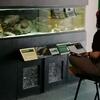Vultures in Africa are under severe threat from poisoning; this has caused the deaths of more than 2,500 vultures in southern Africa since 2011. A recent poisoning incident in Mozambique, where an elephant carcass was deliberately laced with poison, caused the death of 103 critically endangered vultures. These types of events have a devastating impact, and are sadly becoming more frequent. However, in this particular case, a poison response team was able to reach the scene soon after and limit the damage. The quick response of the poison response team prevented the deaths of hundreds more vultures and many other scavenging animals such as hyenas, jackals and lions.
Poisoning often relates to the illegal wildlife trade. Vultures and their parts are traded for traditional medicine or ‘muthi’, and ivory poachers seek to kill vultures, since vultures circling over a carcass can draw the attention of law enforcement. Vultures also become the unintended victims of human-wildlife conflict as they consume poisoned carcasses intended to target carnivores such as lions.
The situation for Africa’s vultures is now critical, and their population declines can have serious consequences for humans and the environment. As scavengers, vultures provide critical ecosystem services by removing the carcasses of animals that would otherwise be left to rot. This waste removal service helps control the populations of disease-carrying mammalian scavengers. Without vultures, the numbers of mammalian scavengers increases, which increases the potential for disease transmission, threatening the health of humans and wildlife.
Poison response activities present a glimmer of hope. Research by the Hawk Conservancy Trust shows that a quick and effective response to poisoning events will help to slow vulture declines and give conservationists more time. The poison response training programme we have developed gives field staff on the ground the skills and equipment they need to respond to poisoning incidents as effectively as possible and prevent further loss of life.
Dr Campbell Murn at the Hawk Conservancy Trust explains: “We are offering support to field staff through the provision of poison response kits and training about how to deal with these scenarios to minimise the damage. Poison response kits don’t stop poisoning from happening but they do stop additional animals from being killed.”
It is difficult to stop poisoning events from happening and it cannot be overlooked that illegal elephant poaching is the underlying issue, and as long as there is elephant poaching, vultures are at risk. But vultures cannot wait for this underlying issue to be resolved. We have already trained more than 1,250 field staff, however much more action is needed, and we have identified additional hotspots in southern and East Africa where we will provide training so the problem can be brought under control. Find out more about the Hawk Conservancy Trust’s Poison Response Action Campaign here.
By Hannah Shaw, Hawk Conservancy Trust
Related Members
-
NewsZSL leads Earth Day lessons for schoolchildren at 10 Downing Street 24th April, 2024Today, to mark Earth Day 2024, pupils from Greater Manchester, South Wales and London schools had the unique experience of stepping inside 10 Downing…
-
News
 Blog: Working for animal welfare really is worth the effort 24th April, 2024Evidence-based animal welfare needn’t be overwhelming writes Katie McDonald, Deana Stephens, and Paul Rose, members of BIAZA’s Animal Welfare…
Blog: Working for animal welfare really is worth the effort 24th April, 2024Evidence-based animal welfare needn’t be overwhelming writes Katie McDonald, Deana Stephens, and Paul Rose, members of BIAZA’s Animal Welfare… -
NewsBlog: Putting National Parks at the heart of nature recovery 19th April, 2024How much do National Parks contribute to conservation? Ruth Bradshaw (Campaign for National Parks) shares findings: 2024 marks the 75th anniversary of…



